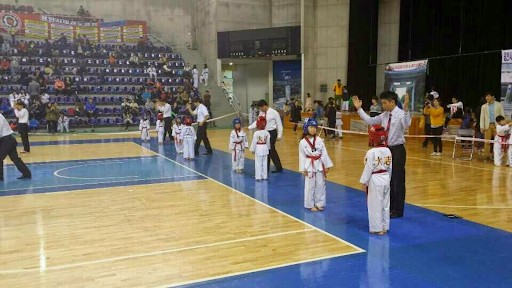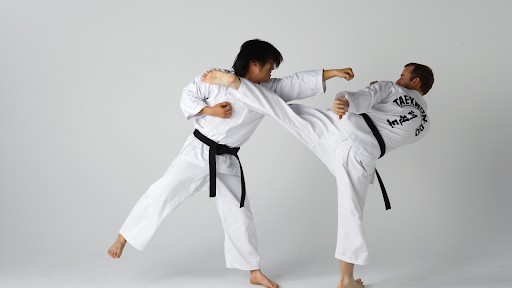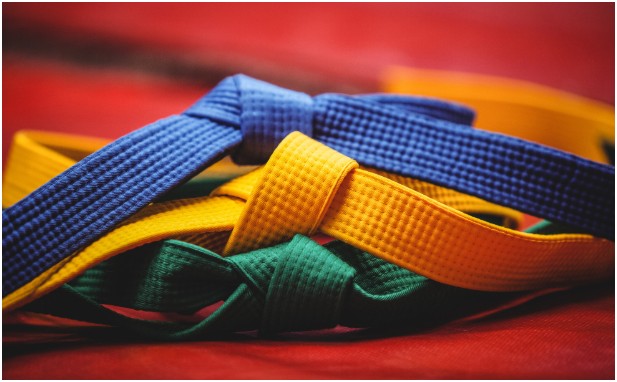Taekwondo is one of the most exciting and dynamic sports in the world today. If you’re a fan of martial arts or Olympic sports, you may have wondered, “Is taekwondo an Olympic sport?”
Yes, taekwondo is an Olympic sport.
Since its official debut in the 2000 Sydney Olympics, taekwondo has been a staple of the Olympic Games, thrilling audiences with its high-energy performances and incredible athleticism.
In this blog, I’ll dive deep into the history of taekwondo as an Olympic sport, how it’s evolved over the years, and what you need to know about this Olympic martial art today.
How Taekwondo Became an Olympic Sport
Taekwondo’s journey to the Olympic stage was a long and eventful one. The martial art, originating from Korea, had already gained significant popularity worldwide by the late 20th century. However, it wasn’t until 1980 that taekwondo was officially recognized by the International Olympic Committee (IOC).
Despite being included as a demonstration sport at the 1988 Seoul Olympics, taekwondo didn’t officially become an Olympic sport until the 2000 Sydney Games. The inclusion of taekwondo in the Olympics wasn’t just a victory for the sport, but for martial arts enthusiasts around the world.
The athletes, the fans, and even the athletes’ families got to experience the prestige of an Olympic event. However, what truly sets taekwondo apart is its unique combination of physical skill, mental focus, and the ability to showcase a high degree of athleticism.
Understanding the Olympic Taekwondo Competition

Taekwondo at the Olympics has a distinct format, and if you’re new to the sport, you might be wondering how it all works. Let me break it down for you:
- Weight Classes: Taekwondo competitions at the Olympics are divided into several weight classes for both men and women. This allows athletes of similar size and strength to compete on an even playing field. The Olympic weight classes typically include:
- Men: Finweight, Flyweight, Bantamweight, Featherweight, Lightweight, Welterweight, Middleweight, Heavyweight.
- Women: Flyweight, Featherweight, Bantamweight, Featherweight, Lightweight, Welterweight, Middleweight, Heavyweight.
- The Scoring System: In Olympic taekwondo, competitors earn points by landing clean, controlled strikes to their opponent’s torso or head.
Points are awarded based on the impact and precision of the kick or punch. A punch to the body scores 1 point, while a spinning kick to the head can earn up to 3 points!
- Time Limits: Matches typically last for three rounds, each round lasting two minutes. If a match is tied at the end of regulation, a “golden point” round can be used to determine the winner.
How Taekwondo Has Shaped the Olympic Games
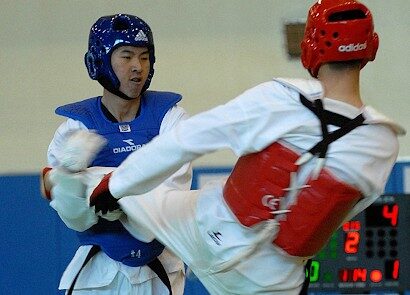
Since its debut, taekwondo has brought a fresh energy to the Summer Olympics, drawing in new fans and adding excitement to the martial arts events. The sport’s popularity continues to grow, and it’s one of the most-watched events at every Olympic Games.
Taekwondo isn’t just about physical prowess; it also has deep roots in philosophy and tradition. The sport’s focus on discipline, respect, and integrity reflects the core values of the Olympics themselves. As a spectator, watching athletes push themselves to the limit, not only physically but mentally, is an inspiring experience.
Famous Olympic Taekwondo Athletes
Over the years, many incredible athletes have made their mark in the Olympic taekwondo arena.
Some of these athletes have become legends, and their stories are an essential part of the sport’s legacy in the Olympics. Here are a few athletes who’ve made history:
- Hadi Saei (Iran) – Saei is widely regarded as one of the best taekwondo athletes of all time. His multiple Olympic gold medals and his impact on the sport are undeniable. He is a hero for many in the taekwondo community.
- Kimia Alizadeh (Iran) – Alizadeh made history as the first Iranian woman to win an Olympic medal in taekwondo. Her achievements have inspired countless young athletes in Iran and across the globe.
- Steven Lopez (USA) – A decorated Olympic athlete, Lopez has won numerous World Championships and Olympic medals, earning a place among the sport’s greats.
How Athletes Qualify for Taekwondo at the Olympics
To compete in Olympic taekwondo, athletes must qualify through a series of tournaments held by the World Taekwondo Federation.
These tournaments test an athlete’s skill, strength, and endurance to ensure only the best compete at the highest level.
National Olympic Committees (NOCs) also play a role in selecting athletes for the Olympic roster.
There are various ways athletes can qualify for the Olympics, including:
- World Taekwondo Championships – This prestigious event offers athletes the opportunity to earn Olympic spots.
- Continental Qualification Tournaments – Different regions hold qualification events where athletes can secure their Olympic berths.
- Olympic Qualification Tournament – The final opportunity for athletes to punch their ticket to the Games.
What’s Next for Taekwondo in the Olympics?
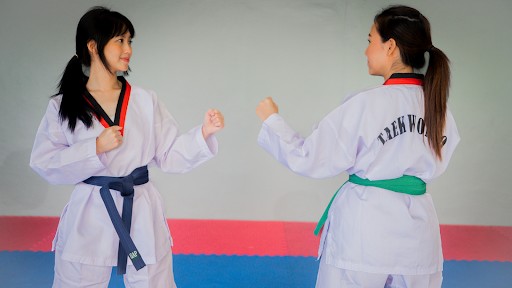
Looking ahead, Taekwondo is set to continue evolving as an Olympic sport. The introduction of new technologies, such as electronic scoring systems, has already improved the accuracy and fairness of competitions.
The future of taekwondo in the Olympics also depends on the continued growth of the sport worldwide, particularly in emerging countries. With each Olympic cycle, new athletes emerge, and the level of competition continues to increase.
Who knows? The next Olympic Games could be the start of a new era for taekwondo!
FAQs: Taekwondo and the Olympics
1. Is taekwondo an official Olympic sport?
Yes, taekwondo is an official Olympic sport. It became a permanent part of the Summer Olympic Games in 2000, after being introduced as a demonstration sport in 1988 and 1992.
Since then, it has been a staple at every Summer Olympics, showcasing athletes’ skills in various weight divisions.
2. Is taekwondo removed from the Olympics?
No, taekwondo has not been removed from the Olympics.
Although discussions have been held about the inclusion or exclusion of various sports over the years, taekwondo remains a core event at the Summer Olympic Games.
It continues to grow in popularity and significance within the Olympic movement.
3. Which country is best at taekwondo?
South Korea is widely considered the best country in taekwondo, given that the sport originated there.
South Korean athletes have consistently dominated Olympic taekwondo competitions, securing numerous gold medals over the years.
Other countries like Iran, China, and the United States have also produced top-level taekwondo athletes and are strong contenders in global competitions.
4. Will taekwondo be in the 2028 Olympics?
Yes, taekwondo will be part of the 2028 Summer Olympics in Los Angeles.
The International Olympic Committee (IOC) has confirmed that taekwondo will continue as an Olympic sport for the foreseeable future, including at the 2028 Games.
Fans can look forward to seeing top athletes compete in this exciting martial art once again.
Conclusion: Why Taekwondo is Here to Stay as an Olympic Sport
So, is taekwondo an Olympic sport? Absolutely! Since its debut in 2000, taekwondo has firmly established itself as one of the most exciting events at the Summer Olympics.
With its blend of skill, strategy, and athleticism, it offers something for both fans and athletes alike. Whether you’re watching to see the fierce competition or because you love the beauty of martial arts,
Taekwondo in the Olympics is here to stay. Let’s continue to celebrate this incredible sport and look forward to the upcoming Olympic Games!






